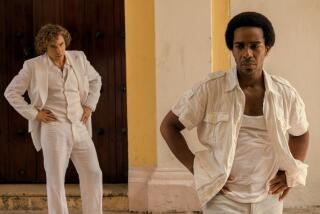Former Black Panther Eldridge Cleaver Dies at 62
- Share via
Former Black Panther leader Eldridge Cleaver, who achieved prominence as a 1960s revolutionary, author and presidential candidate but spent his later years as a conservative idealist concerned with the environment, died Friday at Pomona Valley Hospital Medical Center. He was 62.
A hospital spokeswoman declined to reveal the cause of death, citing a family request. But a neighbor, Peter Apanel, who was with Cleaver on Thursday night said the onetime seminal figure of black militancy had complained of what he believed was a reaction to various medications.
Apanel said Cleaver was battling prostate cancer and was taking insulin. Cleaver told Apanel he had a doctor’s appointment Friday morning but it wasn’t immediately clear how he became hospitalized.
Cleaver had lived most recently in the Pomona-Fontana area and at his death was a consultant to the Coalition for Diversity at the University of La Verne. In his later years, many former admirers had come to see him as an object of ridicule for the political and religious views he embraced.
But “he was a beloved and respected friend here,” Apanel said, adding that many evenings he could be found reading poetry at a neighborhood coffeehouse while building up a repertoire of speeches he hoped would improve his economic situation.
He crafted ceramic pots and warned whoever would listen of his concerns about environmental pollution.
By February, he had moved his life to a point where he exchanged pleasantries at a gathering of Pasadena police officers to which he had been invited, telling them: “You’ll never know how happy I am to meet you under these circumstances.”
All this from a once fierce advocate of violence who shot it out with police and fled into exile from a country he had come to hate.
Cleaver, tall and broad-shouldered with the erect bearing of a soldier, was a self-educated man with a gift for language. He was perhaps best known for writing “Soul on Ice,” a collection of eloquent essays on prison life, interracial relationships and on being black in white America. The book, which he wrote while in Folsom State Prison for sexual assault, earned him praise as one of the most compelling black writers and social critics of the 1960s.
After his release, Cleaver joined the Black Panther Party, attracted, he once said, by its “revolutionary courage.” Branded “the nation’s greatest threat” by FBI Director J. Edgar Hoover, the militant group with its trademark black berets pursued goals ranging from shadowing Oakland police with gun-toting monitors to providing free breakfasts for poor children.
Articulate and possessing a fiery oratorical style, Cleaver was appointed the Panthers’ minister of information. Nicknamed “El Rage” for his tendency to explode in outrage and anger, he quickly became the era’s embodiment of black militancy.
“We were like those who staged the Boston Tea Party,” Cleaver once said of the Panthers. “We refused to go along with oppressive practices. We fought it as best we knew how.”
In the fall of 1968, he became the focus of a cause celebre when then-Gov. Ronald Reagan tried to bar him from lecturing in a course at UC Berkeley. Student demonstrations over the action resulted in hundreds of arrests. Cleaver also ran for president that year as the candidate of the Peace and Freedom Party, getting 30,000 votes.
He had reached the peak of his prominence, but then went into exile. Facing charges of attempted murder in connection with a Panthers shootout with Oakland police, he jumped $50,000 bail and fled the country. He was 33 at the time and said he would “rather be shot down in the street” than return to prison, where he had passed so much of his young life.
Cleaver spent seven years abroad, a Marxist searching for political and racial utopia in Cuba, Algeria, North Korea and the Soviet Union. It was a wrenching time. He missed America, became disillusioned with communism and felt that his life had evaporated into a desperate meaninglessness. “It was like watching the blood flowing out of my veins,” he once told The Times.
In 1975, Cleaver returned home--a stranger to those who had known and idolized him before. As leftists looked on, incredulous, he renounced his revolutionary past, praised the United States government and declared himself a born-again Christian, saying that he had seen the face of Jesus in a full moon. The old attempted murder charge was reduced to assault, and Cleaver was sentenced to 2,000 hours of community service.
Critics called his political and religious conversion a put-on designed to help his court case, but Cleaver replied that he was merely evolving with the times. “Change,” he said, “is not treason. . . . Change is a process of growth.”
Cleaver’s life from that point on became an often perplexing, often tragic series of zigzags--a search, it sometimes seemed, for his real self.
In the late 1970s, he dabbled in fashion, designing trousers with a codpiece-like pouch--called the “Cleaver sleeve”--that was meant to emphasize, rather than conceal, a man’s genitals. But America apparently wasn’t ready for the Cleaver sleeve, so its creator turned his energies to making decorative flowerpots, working for a San Jose tree trimming company and sampling religions.
In 1979, he founded the Cleaver Crusade for Christ and bought 40 acres in the Nevada desert, planning to use it for his ministry’s headquarters. A year later, he shifted gears and formed his own religion--Christlam--along with a peculiar auxiliary he called Guardians of the Sperm. Mormonism came next.
Off and on, the ex-radical claimed to have “visions,” about which he issued public warnings. In one, he saw California struck by a natural disaster and said that “immediate steps must be taken by the federal government to evacuate the state.” In another, he warned then-Gov. Edmund G. “Jerry” Brown Jr. of a plot to murder him before the 1980 election.
Politics continued to entice Cleaver, but shedding his revolutionary past proved no guarantee of success. He ran for the Berkeley City Council in 1984, a candidacy doomed by his opposition to popular rent control laws, and two years later was a Republican candidate for the U.S. Senate. In that race, he condemned affirmative action--saying it promoted unqualified blacks--advocated a peacetime draft, and wore an American flag pin on his suit lapel.
By the late 1980s, Cleaver’s once-resonant voice had fallen silent and he slipped into anonymity, earning a meager living scavenging bottles and broken-down chairs off the streets of Berkeley. The only time his name popped up was on the police blotter for arrests related to cocaine possession and burglary.
Leroy Eldridge Cleaver was born near Little Rock, Ark., in 1935. His father was a waiter and nightclub piano player, and his mother was an elementary school teacher. When his father got a job on a railroad dining car, the family moved to Phoenix, and then to Watts, where Cleaver’s parents separated when he was 13.
A year later, Cleaver had his first brush with the law when he was arrested for bicycle theft and sent to a reformatory. After his release came a series of marijuana-related offenses that ultimately landed him at Soledad State Prison in 1954.
There an interest in literature blossomed, and he consumed the works of Thomas Paine, Karl Marx, Voltaire and W.E.B. Du Bois. He also formed a view of his place in the white man’s world, and grew angry and bitter.
Upon his release, he returned to the drug trade and committed a new crime--rape. He was arrested again within a year on a charge of assault to commit rape, and later explored the roots of his sexual attacks in “Soul on Ice.”
In prison, Cleaver wrote, he “took a long look at myself and . . . admitted that I was wrong, that I had gone astray--astray not so much from the white man’s law as from being human, civilized. My pride as a man dissolved and my whole fragile structure seemed to collapse, completely shattered. That is why I started to write. To save myself.”
He recently was interviewed by Times columnist Patt Morrison and later sent her a message he titled “Changing Times.”
In it he reminisced that “the Black Panthers were neither as good or as bad as all sides say. We were fabulous. We were not just freedom talkers, we were freedom fighters.”
Once married, Cleaver is survived by a son, Maceo, and a daughter, Toju.
More to Read
Sign up for our Book Club newsletter
Get the latest news, events and more from the Los Angeles Times Book Club, and help us get L.A. reading and talking.
You may occasionally receive promotional content from the Los Angeles Times.






